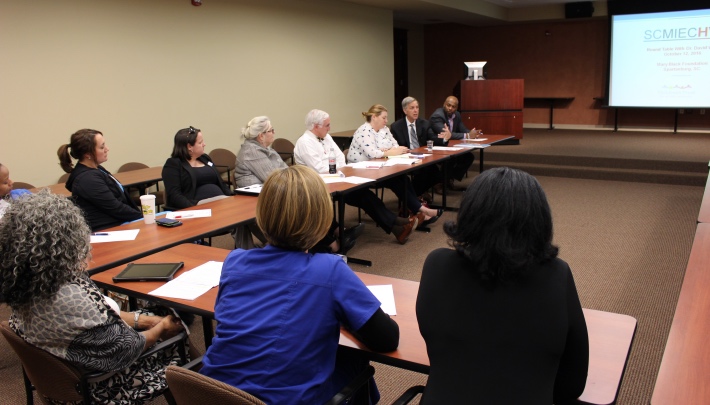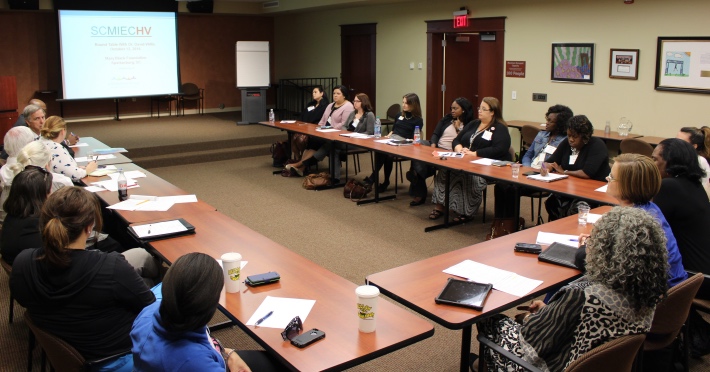Five of Children’s Trust home visiting partners in the Upstate had the opportunity recently to meet with Dr. David Willis, the director of the Home Visiting and Early Childhood Systems for the U.S. Department of Health and Human Services. They discussed the impact of the Maternal, Infant and Early Childhood Home Visiting (MIECHV) program. Neil White and Michael Shirley, who tell the stories of Children’s Trust, covered the event at the Mary Black Foundation in Spartanburg.
Dr. David Willis sat at a roundtable discussion hosted by Children’s Trust in October and shared his national perspective on the home visiting program with five local implementing agencies in South Carolina.
As the director of the Home Visiting and Early Childhood Systems for the U.S. Department of Health and Human Services, Willis welcomed the opportunity to discuss how the Maternal, Infant and Early Childhood Home Visiting (MIECHV) program is working with a group of providers in the field. He spoke of the essential work being done for families, mothers and new babies to help them reach their full potential in areas of health, development and early learning. He noted the support for the home visiting program and the positive viewpoint of it nationally from multiple stakeholders.

Dr. David Willis addresses the roundtable of home visitors in the Upstate.
Willis welcomed the input from on-ground partners as they gave updates and addressed their challenges on home visiting, which is a proven early-intervention strategy that pairs volunteer families with specialists such as nurses or social workers. Home visiting program models allow parents with newborns the opportunity to receive health care and parenting information through pediatric visits and home visits.
As this state’s federal grantee and lead agency for the MIECHV program, Children’s Trust supports five evidence-based home visiting models – Healthy Steps, Healthy Families America, Nurse-Family Partnership, Parents as Teachers, and Family Check-Up – in partnership with 16 implementing agencies in 39 counties. “It’s amazing to be with home visitors who are on the ground doing the work every day and realizing their commitment, the depth of their knowledge and the support they provide families all across the state,” said Willis, who joined HRSA’s Maternal Child Health Bureau in 2012 as its director after a long-standing stint as a pediatric and early childhood leader in Oregon.
The partners participating with Willis and Children’s Trust home visiting staff that day were Greenville’s A Child’s Haven (Parents as Teachers), Greenville Health System (Nurse-Family Partnership), Greenville Health System Center for Pediatric Medicine (Healthy Steps), The Parenting Place-Prevent Child Abuse Pickens (Healthy Families America, Family Check-Up) and Spartanburg First Steps/Spartanburg Regional Hospital System (Nurse-Family Partnership). Alesia Lowe, the clinical director for A Child’s Haven and a licensed professional counselor, has watched the success of the Parents as Teachers model in her community.
She understands the bonds that can develop between a home visitor and a new mother as they help an infant through the first years of its life. “We see parents that don’t have a lot of of direction, they don’t have a lot of support, and they don’t have a lot of family members in the community and different people that can help them with resources,” Lowe said. “Once they come to A Child’s Haven, they link up with a family support counselor, classroom staff and different people that can help them.
Then they begin to see a change in their child’s behavior, which gives them hope. Once we go into the home, we also can help the parent to build the structure, and they begin to have that feeling of empowerment.” Trish Dillard, a nurse home visitor for Greenville Health System’s (GHS) Nurse-Family Partnership, called the program the most impactful one of her career.
A nurse for 37 years and home visitor for the last seven, she enjoys helping young women who are experiencing their first pregnancy and being able to impact the way they take care of themselves during the pregnancy, the way they understand the child, and the way the child communicates with them. She noted that it’s a privilege to be invited into their homes and join them in their lives and their communities as they blossom into parents who can equip their child to learn.
“What is exciting for me as a nurse is to be able to watch the family grow in their understanding of their child and what the developmental milestones are and the critical role parents play in reaching that goal,” Dillard said.

Five local implementing agencies reported on their home visiting programs funded through the federal MIECHV grant.
Willis appreciated the feedback from each of the five agencies, quizzing them with follow-up questions on certain points to ensure he had a better understanding of their experiences. He called the program a game-changer for families in South Carolina and across the country.
“I’m learning of the connecting points of how MIECHV has really brought multiple partners to the table,” Willis said. “I can see the future that South Carolina’s home visiting sees, and that is reaching more families, touching more communities, strengthening the health system connections, (and) improving the mental health supports that home visitors provide to families. They’re eager, they’re a strong group with strong leadership, and I’m happy to be able to carry that message back to the program nationally.”
Dr. Robert Saul, chief of general pediatrics at the GHS Center for Pediatric Medicine, sees it the same way in terms of a real need for the home visitation program. His agency sees many vulnerable patients that can benefit from intervention services. “As a matter of fact, we could use a lot more than what we have,” Saul said. “We recognize it’s a program that’s very labor-intensive and needs to grow incrementally.”
Saul remains hopeful the MIECHV program will continue to expand through the guidance of HRSA on a national level and Children’s Trust on a state level. “The sky’s the limit. I’d love to be able to do this so much more than what we do. Our families need so much more assistance. Our job is not to tell them what to do but to be there to support them in this whole process,” Saul said. “We need someone to help coordinate that, and that’s what the home visitation program can do.” If home visiting continues to grow, Dillard envisions benefits that will reach far past today’s infants. “It’s a generational change that we’re seeing, and that’s important,” she said.
Maternal, Infant, and Early Childhood Home Visiting is a program of Children’s Trust of South Carolina and is supported by the Health Resources and Services Administration (HRSA) of the U.S. Department of Health and Human Services (HHS) under CFDA # 93.505, Grant # D89MC26365. This information or content and conclusions are those of the author and should not be construed as the official position or policy of, nor should any endorsements be inferred by HRSA, HHS or the U.S. Government.




